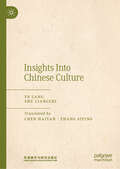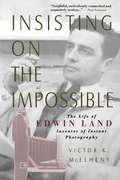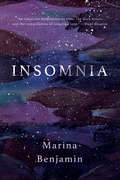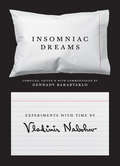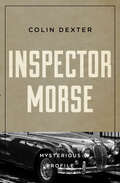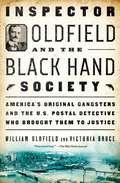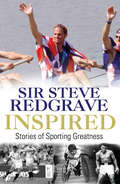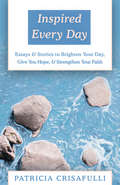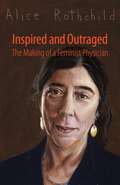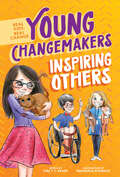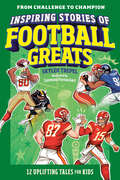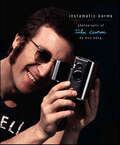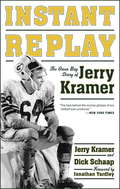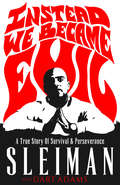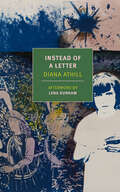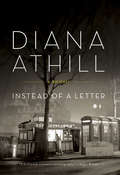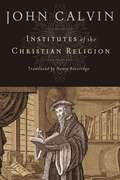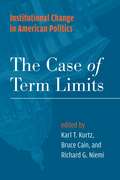- Table View
- List View
Insights into Chinese Culture
by Ye Lang Zhu LiangzhiHighlighting the pinnacle achievements of Chinese culture, this book presents the authors’ profound insights into the concepts and passions that have shaped the Chinese nation over the past 5,000 years. By exploring this rich historical legacy of remarkable creativity and innovative spirit, still evident today in living masterpieces of art, architecture and fascinating folk traditions, readers will gain a deeper understanding of the cultural identity, worldview, aesthetic pursuits, and national spirit of the Chinese people.
Insist That They Love You: Craig Rodwell and the Fight for Gay Pride
by John Van HoesenSet against the vibrant backdrop of New York and Chicago, Insist That They Love You presents a comprehensive biography of Craig Rodwell, an unheralded yet pivotal figure in the militant gay rights movement of the 1960s and 1970s.Award-winning journalist John Van Hoesen explores cities grappling with social change, while highlighting Craig Rodwell’s transformative impact. The book traces Rodwell’s journey from a complicated childhood in a Christian Science boarding school and turbulent teenage years to his prominent role as an activist in adulthood. Founder of the first bookstore of its kind dedicated to gay and lesbian literature – the Oscar Wilde Memorial Bookshop – Rodwell played a crucial role in the early protests for gay rights, the Stonewall Riots, and the inaugural pride march of 1970. The book also thoughtfully considers the trajectory of Rodwell’s tumultuous personal life, including his relationship with Harvey Milk. Insist That They Love You honours Rodwell’s vital contributions to the gay rights movement, bringing to life for readers the fearless determination and hard work that built today’s freedoms. This compelling biography inspires readers to reflect on the power of truth, courage, and action to further social change.
Insisting on the Impossible: The Life of Edwin Land, Inventor of Instant Photography (Sloan Technology Series)
by Victor K. McelhenyThis fascinating biography of the great inventor and entrepreneur Edwin Land captures the very essence of technological innovation. Renowned as the inventor of instant photography, Land won 535 patents, joining Edison among the world's most prolific inventors. While still in his teens, this Magellan of modern technology invented sheet polarizers and went on to build a tiny research lab into a gigantic enterprise that turned out a vast and continuous array of innovations. McElheny draws a vivid and memorable portrait of this extraordinary man, in the lab, in the boardroom, in high-secret defense work including the spearheading of the U2 spy plane. His penetrating insight into Land's innovative genius will speak to anyone interested in business, science, photography or government.
Insomnia
by Marina Benjamin“An insomniac’s ideal sleep aid—and that’s a compliment. With her collage of ruminations about sleeplessness, [Benjamin] promises no real cure . . . Her slim book is what the doctor ordered.”—The Atlantic Insomnia is on the rise. Villainous and unforgiving, it’s the enemy o f energy and focus, the thief of our repose. But can insomnia be an ally, too, a validator of the present moment, of edginess and creativity? Marina Benjamin takes on her personal experience of the condition—her struggles with it, her insomniac highs, and her dawning awareness that states of sleeplessness grant us valuable insights into the workings of our unconscious minds. Although insomnia is rarely entirely welcome, Benjamin treats it less as an affliction than as an encounter that she engages with and plumbs. She adds new dimensions to both our understanding of sleep (and going without it) and of night, and how we perceive darkness. Along the way, Insomnia trips through illuminating material from literature, art, philosophy, psychology, pop culture, and more. Benjamin pays particular attention to the relationship between women and sleep—Penelope up all night, unraveling her day’s weaving for Odysseus; the Pre–Raphaelite artists’ depictions of deeply sleeping women; and the worries that keep contemporary females awake. Insomnia is an intense, lyrical, witty, and humane exploration of a state we too often consider only superficially. “This is the song of insomnia, and I shall sing it,” Marina Benjamin declares.
Insomniac Dreams: Experiments with Time by Vladimir Nabokov
by Vladimir Nabokov Gennady BarabtarloNabokov's dream diary, published for the first time—and placed in biographical and literary contextOn October 14, 1964, Vladimir Nabokov, a lifelong insomniac, began a curious experiment. Over the next eighty days, immediately upon waking, he wrote down his dreams, following the instructions he found in An Experiment with Time by the British philosopher John Dunne. The purpose was to test the theory that time may go in reverse, so that, paradoxically, a later event may generate an earlier dream. The result—published here for the first time—is a fascinating diary in which Nabokov recorded sixty-four dreams (and subsequent daytime episodes) on 118 index cards, which afford a rare glimpse of the artist at his most private. More than an odd biographical footnote, the experiment grew out of Nabokov’s passionate interest in the mystery of time, which influenced many of his novels, including the late masterpiece Ada.Insomniac Dreams, edited by leading Nabokov authority Gennady Barabtarlo, presents the text of Nabokov’s dream experiment, illustrated with a selection of his original index cards, and provides rich annotations and analysis that put them in the context of his life and writings. The book also includes previously unpublished records of Nabokov’s dreams from his letters and notebooks and shows important connections between his fiction and private writings on dreams and time.
Inspector Morse: A Mysterious Profile (Mysterious Profiles)
by Colin DexterThe international-bestselling author answers readers’ questions and discusses the origins of the Oxford inspector with a penchant for classical music.In 1975, Inspector Morse debuted, working to solve the case of a murdered hitchhiker in Colin Dexter’s Last Bus to Woodstock. The book led to a multimillion-bestselling mystery series and a television show that spawned a spinoff and a prequel. But how did the beloved DCI from Oxford come to be exactly?In this quick read, Colin Dexter addresses some of the many questions posed to him by his readers. He reveals what motived him to break into crime writing and which authors and novels influenced him. He discusses Morse’s many traits and inner workings, as well as how he got his first Morse novel published. He also shares how he maintains a discipline with writing, how he deals with critics, and what it’s like to transform a series of novels into a television series.Praise for the Inspector Morse Novels“[Morse is] the most prickly, conceited, and genuinely brilliant detective since Hercule Poirot.” —The New York Times Book Review“A masterful crime writer whom few others match.” —Publishers Weekly “Let those who lament the decline of the English detective story reach for Colin Dexter.” —The Guardian“It is a delight to watch this brilliant, quirky man [Morse] deduce.” —Minneapolis Star-Tribune
Inspector Oldfield and the Black Hand Society: America's Original Gangsters and the U.S. Postal Detective who Brought Them to Justice
by Victoria Bruce William OldfieldThe incredible true story of the US Post Office Inspector who took down the deadly Black Hand, a turn-of-the-century Italian-American secret society that preyed on immigrants across America’s industrial heartland—featuring fascinating and never-before-seen documents and photos from the Oldfield family’s private collection.Before the emergence of prohibition-era gangsters like Al Capone and Lucky Luciano, there was the Black Hand: an early twentieth-century Sicilian-American crime ring that preyed on immigrants from the old country. In those days, the FBI was in its infancy, and local law enforcement were clueless against the dangers—most refused to believe that organized crime existed. Terrorized victims rarely spoke out, and the criminals ruled with terror—until Inspector Frank Oldfield came along. In 1899, Oldfield became America’s 156th Post Office Inspector—joining the ranks of the most powerful federal law enforcement agents in the country. Based in Columbus, Ohio, the unconventional Oldfield brilliantly took down train robbers, murderers, and embezzlers from Ohio to New York to Maryland. Oldfield was finally able to penetrate the dreaded Black Hand when a tip-off put him onto the most epic investigation of his career, culminating in the 1909 capture of sixteen mafiosos in a case that spanned four states, two continents—and ended in the first international organized crime conviction in the country. Hidden away by the Oldfield family for one hundred years and covered-up by rival factions in the early 20th century Post Office Department, this incredible true story out of America’s turn-of-the-century heartland will captivate all lovers of history and true crime.
Inspiration: Profiles of Black Women Changing Our World
by Crystal McCrary Nathan Hale Williams30 extraordinary black women—including Michelle Obama, Soledad O’Brien, Shonda Rhimes and others—share their personal stories in this inspiring volume.Whether in the White House or on the courts of Wimbledon, in Hollywood or on the stage of the Metropolitan Opera House, these trailblazing black women have influenced the social, cultural, and political landscape of this country, and even the world. Speaking in their unique voices, luminaries such as Patti LaBelle, Venus Williams, and Susan Taylor share the challenges they’ve faced and the victories they’ve won throughout their careers. Contributors include Iman, Misty Copland, Whoopi Goldberg, Mary J. Blige, Gayle King, Judith Jameson, and others. These women pass their knowledge and lessons on to a new generation of women in intimate first-person essays and stunning color portraits.
Inspirational Lives: Usain Bolt
by Simon HartThe series focuses on the people who inspire children today. Each book looks at the background, life and achievements of a personality, their impact on popular culture as well as detailing the everyday facets of their job and how they have gained such success.
Inspired
by Sir Steve RedgraveInspiration, something much needed in these times, abounds as Sir Steve relates the entertaining tales of his fellow sportsmen and women that spurred on his success.From Jonny Wilkinson’s famous dropkick, Roger Bannister’s 4-minute mile and Brian Clough’s self-belief to tales of lesser known characters from his childhood and personal life, Sir Steve narrates with passion and awe, the motivation gained from his heroes and peers. Overcoming adversity, the importance of teamwork, graft and a little bit of luck all contribute to Sir Steve’s overwhelming triumphs, both in and out of the boat, as he strove to overcome diabetes to win his fifth gold medal in spectacular style. Here he divulges the stories that inspired him, roused him and made his wildest dreams a magnificent reality.
Inspired
by Sir Steve RedgraveInspiration, something much needed in these times, abounds as Sir Steve relates the entertaining tales of his fellow sportsmen and women that spurred on his success.From Jonny Wilkinson’s famous dropkick, Roger Bannister’s 4-minute mile and Brian Clough’s self-belief to tales of lesser known characters from his childhood and personal life, Sir Steve narrates with passion and awe, the motivation gained from his heroes and peers. Overcoming adversity, the importance of teamwork, graft and a little bit of luck all contribute to Sir Steve’s overwhelming triumphs, both in and out of the boat, as he strove to overcome diabetes to win his fifth gold medal in spectacular style. Here he divulges the stories that inspired him, roused him and made his wildest dreams a magnificent reality.
Inspired Every Day
by Patricia CrisafulliFinding extraordinary grace in ordinary momentsThis collection of short stories and essays celebrates reconnection, possibility, faith, forgiveness, joy, and love, encouraging readers to find moments of extraordinary grace in the midst of ordinary life.
Inspired Journeys: Travel Writers in Search of the Muse
by Brian BouldreyFull of humor, profundity, and obsession, these are tales of writers on peregrine paths. Some set out in search of legends or artistic inspiration; others seek spiritual epiphany or fulfillment of a promise. Their journeys lead them variously to Dracula's castle, Laura Ingalls Wilder's prairie, the Grimms' fairy-tale road, Mayan temples, Nathaniel West's California, the Camino de Santiago trail, Scott's Antarctica, the Marquis de Sade's haunted manor, or the sacred city of Varanasi. All of these pilgrimages are worthy journeys--redemptive and serious. But a time-honored element of pilgrimage is a suspension of rules, and there is absurdity and exuberance here as well.
Inspired and Outraged: The Making of a Feminist Physician
by Alice RothchildA remarkable autobiography of Alice Rothchild's journey from 1950's good girl to irreverent, feisty, feminist obstetrician-gynecologist forging her own direction in the contradictory, sexist world of medicineA remarkable autobiography—written entirely in free verse—of Alice Rothchild's journey from 1950's good girl to irreverent, feisty, feminist obstetrician-gynecologist forging her own direction in the contradictory, sexist world of medicine. As a child who came of age in the turbulent 1960s, she was compelled to create a path in the often outrageous, male-dominated medical field, repeatedly finding herself to be a first: accepted into an ob-gyn residency, opening an all-woman practice, working with midwives, challenging the status quo, shaped by her early involvement with Our Bodies Ourselves. Rothchild's poems are steeped in the often-shocking history of medicine and the conflicted sexual politics of the second half of the twentieth century.
Inspiring Others (Young Changemakers)
by Stacy C BauerYoung Changemakers is an inspirational series all about real kids from around the globe doing extraordinary things to make a difference in their communities and the world!Inspiring Others is filled with stories of young people who saw a need for change and were inspired to BE the change. After finding something they are passionate about, they took action. From protecting endangered animals to collecting gifts for kids in hospitals, these kids will inspire you to make a difference too!
Inspiring Stories of Football Greats: 12 Uplifting Tales for Kids (From Challenge to Champion)
by Skyler TrepelNurture your child&’s inner champion—and get them reading more—with this inspirational football book for kids, ages 6–9.Does your football-obsessed kid devour every stat and story about their favorite players and teams? Thrill them with From Challenge to Champion: Football, an uplifting collection of stories about legendary NFL teams and athletes who overcame adversity—including injury, doubt, or tough beginnings—and emerged as winners. Whether your kid is a fan of all-time greats like Joe Montana, Jerry Rice, and Peyton Manning or today&’s stars like Josh Allen, Lamar Jackson, and Travis Kelce, these stories of hard work and resilience are sure to inspire them to dream big! Perfect for bedtime reading, classroom libraries, or as a gift, this football book is a must-have for young sports lovers and readers.Star-studded lineup of football GOATs. Discover the stories and facts behind the 1972 Miami Dolphins, 2001 New England Patriots, Joe Montana, Jerry Rice, Kurt Warner, Michael Strahan, Peyton Manning, Troy Polamalu, Laurent Duvernay-Tardif, Lamar Jackson, Patrick Mahomes, Travis Kelce, Josh Allen, Jalen Hurts, and Saquon Barkley.A playbook of life lessons. Valuable advice on teamwork, perseverance, growth mindset, and self-belief will inspire young readers to go after their own dreams.Additional athletes to know and love. Twelve short biographies of current NFL stars including Jayden Daniels, Brock Purdy, Puka Nacua, Justin Jefferson, Patrick Surtain II, and others.Easy-to-read format is a touchdown for young readers. Brief chapters, fun illustrations, and simple sentences build reading skills and keep kids engaged.Looking for more books for your little sports fan? Check out the first book in the series, From Challenge to Champion: 12 Inspiring Sports Stories for New Readers and the forthcoming From Challenge to Champion: Baseball.
Instagram®: How Kevin Systrom & Mike Krieger Changed the Way We Take and Share Photos
by Rosa WatersInstagram has had huge success in just a short time. With a popular website and smartphone app, Instagram has become one of the best ways to share pictures with friends. Instagram, however, was once just the idea of two men: Kevin Systrom and Mike Krieger. Together, these two men have taken Instagram to new heights and made it one of the most popular tech companies. Discover their story. Find out how Instagram grew to what it is today.
Instamatic Karma: Photographs of John Lennon
by May Pang"There were times I was a bit reticent in taking out my camera, like when some 'old friends' stopped by to hang out. I didn't want to intrude on these moments, but John insisted. He felt that I captured him in ways that no one else did because of his comfort level with me...For years, only my closest friends got to see these photos-which were literally tucked away in a shoebox in my closet. They were surprised that these images did not convey the John that was portrayed in the press during our time together. In fact, they saw a side of John seldom seen."-From INSTAMATIC KARMAJohn Lennon is the most famously photographed Beatle-everyone from Iain MacMillian to Annie Lebowitz took iconic images of him-but there have never been pictures of him like these taken by May Pang, Lennon's girlfriend from 1973 to 1975. In INSTAMATIC KARMA, they're collected for the first time. With very few exceptions, these photos are that rare thing: never-before-seen images of an icon. The photos here show Lennon in a variety of settings: at work, at play, at home, and away. They show a playful Lennon, a casual, unguarded Lennon; they're the kind of photos one lover takes of another. May has written rich captions to accompany her photos--taken together, they tell a simple story of the time May and Lennon spent together; a time, according to legend, when Lennon was unhappy and unproductive, estranged from his family and bandmates. Pang's photos clearly tell another story-they show Lennon clowning around, working on his hit album "Walls and Bridges", embracing old friends and family, hanging out in their apartment on Manhattan's East 52nd Street, relaxing in the country in upstate New York or spending peaceful days swimming in the waters of Long Island. The photographs in INSTAMATIC KARMA are both color and black & white, casual Polaroids and more composed shots. Each one is an intimate glimpse into a fascinating time in John Lennon's life.
Instant Mom
by Nia VardalosA New York Times bestseller, Instant Mom is Academy Award-nominated writer/star Nia Vardalos’s true story of becoming a mother through adoption.“Some families are created in different ways but are still, in every way, a family.”Writer and star of My Big Fat Greek Wedding, Nia Vardalos firmly believed she was supposed to be a mom, but Mother Nature and modern medicine had put her in a headlock. So she made a choice that shocked friends, family, and even herself: with only fourteen hours’ notice, she adopted a preschooler.Instant Mom is Vardalos’s poignant and hilarious true chronicle of trying to become a mother while fielding nosy “frenemies” and Hollywood reporters asking, “Any baby news?” With genuine and frank honesty, she describes how she and husband Ian Gomez eventually found their daughter . . . and what happened next. Vardalos explores innovative ways to conquer the challenges all new moms face, from sleep to personal grooming, and learns that whether via biology, relationship, or adoption—motherhood comes in many forms.Featuring laugh-out-loud behind the scenes Hollywood anecdotes, Vardalos candidly shares her instant motherhood story that is relatable for all new moms (and dads!)“If you have ever considered bringing a child who isn’t an infant into your family, it’s the book you’ll want to read. And if you just enjoy a good, honest memoir, it’s the book for you, too.” —New York Times’ Motherlode Blog “Refreshingly candid for all parents-plus anyone considering adoption. We know Nia is many things: writer, actress, director, musical theater lover! Here, though, you learn she is a mom first. Pure, beautiful honesty.” —Kristin Chenoweth
Instant Replay: The Green Bay Diary of Jerry Kramer
by Dick Schaap Jerry KramerINSTANT REPLAY spent thirty-seven weeks on The New York Times Bestseller List when it was published in 1968. The perceptive and highly entertaining diary of the 1967 season by Jerry Kramer, a Packer offensive guard, it remains the most beloved and highly regarded portrait of life on a pro football team back when the game was all blood, grit, and tears. This new hardcover edition features classic photos of both the team and its unforgettable coach, Vince Lombardi, and a foreword in which Washington Post book critic Jonathan Yardley calls the diary "the best inside account of pro football, indeed the best book ever written about that sport and that league. " INSTANT REPLAY is a must-read for all fans, an irreplaceable reminder of the glory days of pro football.
Instead We Became Evil: A True Story Of Survival & Perseverance
by Sleiman Dart AdamsA powerful story of struggle, survival, and hope for the future is told by one of Denmark's most successful artists. The violent, compelling debut, co-written with journalist Dart Adams, provides a complex portrait of one man and the various ways in which every social system that was supposed to help him failed him, while also delving into the psychology of immigrant gangs and the young men who fall into them. But ultimately, it's a narrative about tenacity, survival, and optimism for the future. Sleiman was born in Lebanon during the 1982 bombardment and is a Palestinian. His family eventually moved to Denmark, but their new life there was far from perfect. Sleiman was subjected to domestic violence as well as social rejection as a Muslim immigrant. Angry and powerless, he found himself drawn to gang life.Sleiman had dropped out of school and was one of his gang's most feared and revered members as a teenager. He was involved in hundreds of crimes during his peak, but after surviving an attempted assassination, he addressed his demons and permanently abandoned the gang life. Sleiman is now narrating his story in his own words in the hopes of discouraging others from following in his footsteps.
Instead of a Letter
by Diana AthillWhen Diana Athill, nearly forty-three and far from a household name, sat down to write Instead of a Letter, the first in her series of trailblazing memoirs, she was looking for an answer to the question &“What have I lived for?&” In this searching book, she recalls her child-hood on her grandparents&’ magnificent estate, the teenage romance that was certain to lead to marriage, her university days coinciding with the Second World War, and the sudden dissolution of her engagement, a loss that became the defining experience of the next twenty years of her life. Athill is as forthright in confessing her faults as she is in celebrating her triumphs. &“From this table, with this white tea-cup, full ashtray, and small glass half full of rum beside me,&” she writes, &“I see my story, ordinary enough though it has all been and sad though much of it was, as a success story.&”
Instead of a Letter: A Memoir
by Diana AthillA classic memoir by the author of the New York Times bestseller Somewhere Towards the End. As a young woman, Diana Athill was engaged to an air force pilot--Instead of a Letter tells how he broke off the engagement, married someone else, and, worst of all, died overseas before she could confront or forgive him. Evoking perfectly the picturesque country setting of her youth, this fearless and profoundly honest story of love and modern womanhood marks the beginning of Athill's brilliant literary career.
Institutes of the Christian Religion
by John Calvin Jean Calvin Henry BeveridgeA colossal milestone of Christian thought―at an irresistible price! Here in a convenient one-volume edition is John Calvin’s magnum opus. Written as an introduction to the Christian life, the Institutes remains the best articulation of Reformation principles and is a marvelous introduction to biblical Christianity. Newly re-typeset for clarity, this volume translated by Henry Beveridge offers a more affordable edition of one of the last millennium’s must-have works. This book will appeal to libraries, seminarians, pastors, and laypeople. <p><p>Institutes of the Christian Religion by John Calvin is an introduction to the Bible and a vindication of Reformation principles by one of the Reformation’s finest scholars. At the age of twenty-six, Calvin published several revisions of his Institutes of the Christian Religion, a seminal work in Christian theology that altered the course of Western history and that is still read by theological students today. It was published in Latin in 1536 and in his native French in 1541, with the definitive editions appearing in 1559 (Latin) and in 1560 (French). The book was written as an introductory textbook on the Protestant faith for those with some learning already and covered a broad range of theological topics from the doctrines of church and sacraments to justification by faith alone. It vigorously attacked the teachings of those Calvin considered unorthodox, particularly Roman Catholicism, to which Calvin says he had been “strongly devoted” before his conversion to Protestantism. The overarching theme of the book―and Calvin’s greatest theological legacy―is the idea of God’s total sovereignty, particularly in salvation and election. <p><p>John Calvin (1509–1564), a French theologian and reformer, was persecuted as a Protestant. As a result, he traveled from place to place. In 1534 at Angouleme he began the work of systematizing Protestant thought in his Institutes of the Christian Religion, one of the most influential theological works of all time.
Institutional Change in American Politics
by Karl T. Kurtz Bruce Cain Richard G. NiemiThe 12 chapters presented here by Kurtz (director of the Trust for Representative Democracy at the National Conference of State Legislatures), Cain (political science, U. of California at Berkeley), and Niemi (political science, U. of Rochester) collectively provide a comparative examination of the impact of term limits on state legislatures in the United States, focusing more on effects on the organization and operation of the legislatures than on the effects of turnover on the kinds of individuals elected, although that is discussed in the opening chapters. Other chapters examine leadership selection and tenure; the attitudes of legislators towards their jobs; the decline of the roles of committees in obtaining independent information, serving as a forum for deliberation, and regulating the flow of bills to the legislature; impacts on legislative staff; legislator interrelations; lobbyist influence; legislature-executive relations; and legislator learning and training. Annotation ©2008 Book News, Inc. , Portland, OR (booknews. com)
